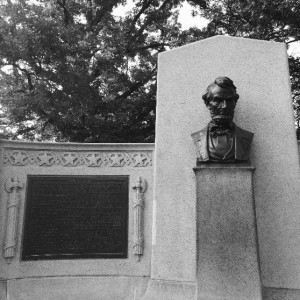
April 14th, 2015 is the 150th anniversary of Abraham Lincoln’s assassination. Looking back today, the role of his influence in leading the United States through its most tumultuous of times remains exemplary.
Last summer, I was fortunate to visit Gettysburg, PA for the first time. It was a hot August weekend. Humid with the Northeast’s historical charm. Gettysburg is filled with the sites that defined the United States at a time where we could’ve crumbled 100 years after being founded.
Gettysburg also is synonymous with Abraham Lincoln, where he delivered the famous Gettysburg Address. It was a striking moment for Mr. Lincoln, an indelible mark of his superior leadership and strength.
 Here was a man who was willing to make the ultimate investment of hundreds of thousands of lives, standing in a space where so many had already died, telling everyone that the concept of America and freedom is bigger than anything.
Here was a man who was willing to make the ultimate investment of hundreds of thousands of lives, standing in a space where so many had already died, telling everyone that the concept of America and freedom is bigger than anything.
Imagine the influence he needed to pull that off. Imagine his innovation, using a speech built of 10 sentences and a few minutes to convey that – as opposed to the “traditional approach” of 2-hour monologues that were customary at the time. What’s more is he did this during such times of horror, chaos and destruction. Yet he lead with the opposite, bringing solace and strength to people in misery.
He was a man willing to go to any length imaginable for the cause of a United States. He ultimately succeeded. He ultimately paid his own life for it by assassination.
The dark side of influence
The same influence and innovation Mr. Lincoln had, John Wilkes Booth also had. He was a celebrity. A handsome man made famous and wealthy through his acting career based in New York City. His brother and family were of similar status. Edwin, Booth’s brother, is remembered by statue today in Manhattan’s Gramercy Park.
 Mr. Booth seemingly had embodied the American Dream before it was the American Dream. But Booth’s aggressive hatred of emancipation and other Lincoln-based ideals overshadowed his great career accomplishments.
Mr. Booth seemingly had embodied the American Dream before it was the American Dream. But Booth’s aggressive hatred of emancipation and other Lincoln-based ideals overshadowed his great career accomplishments.
He became consumed by the thought of assassinating President Lincoln, for he thought that would be the answer for a prosperous America. He had great plans and conspiracies to accomplish this, but it was something he needed a team for. He recruited and selected others of like-intent and supporting skill set…careful not to hire himself exactly. He influenced people to levels they never thought they would go themselves. His influence became so great it should be construed as manipulation.
Influence used in this manner was what ultimately lead to death of one of America’s most prominent leaders.
My takeaway
Influence is a powerful leadership quality; one that should never be taken lightly. As a leader, you are a person of great influence. Those who follow you will be pulled in the directions you suggest, positive or negative. It will be up to you to guide wisely.
If you are interested in more details of this story, I suggest you read Killing Lincoln by Bill O’Reilly and Martin Dugard.
 Print This Post
Print This Post
